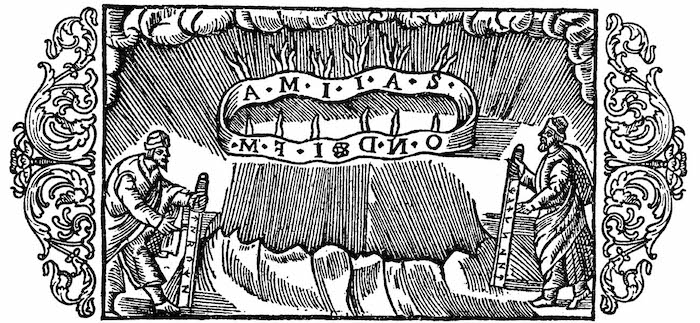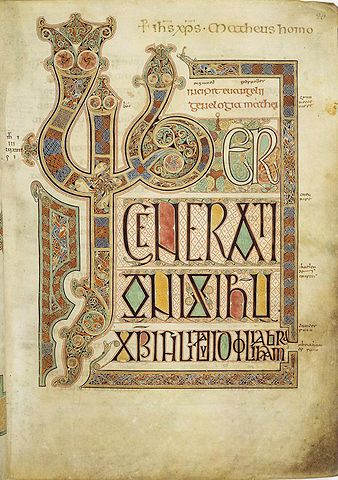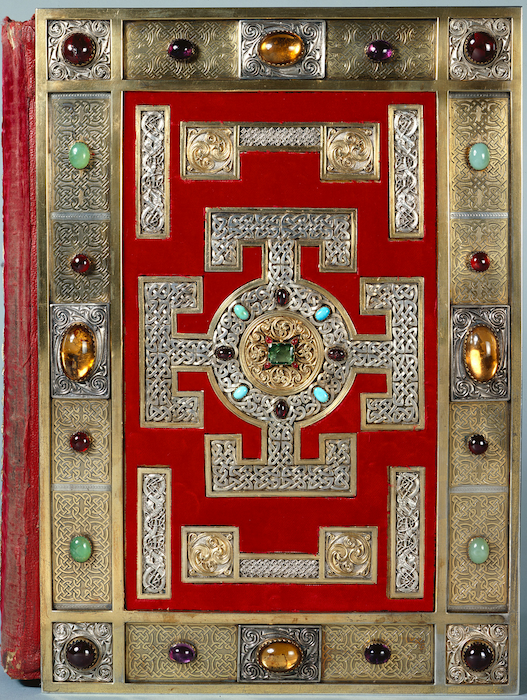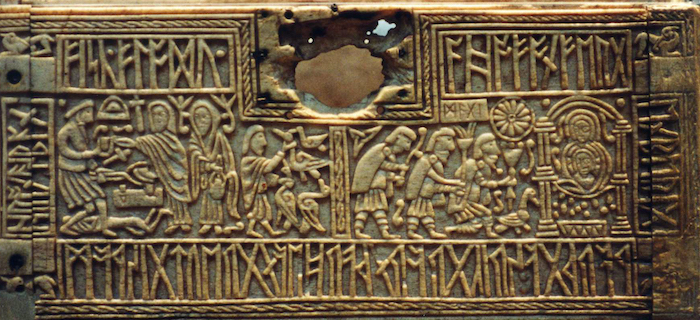Exeter Riddle 60
MEGANCAVELL
Date: Fri 17 Mar 2017Matching Commentaries: Commentary for Exeter Riddle 60
Riddle 60’s translation is once again by Brett Roscoe of The King’s University, Alberta. (thanks, Brett!)
Ic wæs be sonde, sæwealle neah,
æt merefaroþe,* minum gewunade
frumstaþole fæst; fea ænig wæs
monna cynnes, þæt minne þær
5 on anæde eard beheolde,
ac mec uhtna gehwam yð sio brune
lagufæðme beleolc. Lyt ic wende
þæt ic ær oþþe sið æfre sceolde
ofer meodubence muðleas sprecan,
10 wordum wrixlan. Þæt is wundres dæl,
on sefan searolic þam þe swylc ne conn,
hu mec seaxes ord ond seo swiþre hond,
eorles ingeþonc on ord somod,
þingum geþydan, þæt ic wiþ þe sceolde
15 for unc anum twam ærendspræce
abeodan bealdlice, swa hit beorna ma
uncre wordcwidas widdor ne mænden.**
I was by the shore, near the sea-cliff,
with the surging of the waves.* I remained
fixed at my first place; there were few
of mankind who there,
5 in that solitude, could see my home,
but each morning the wave in its dark,
watery embrace enclosed me. Little did I know
that ever before or after,
I – mouth-less – across the mead-bench would have to speak,
10 exchange words. It is a kind of wonder
to one who does not know such things,
how, with a clever mind, the point of a knife,
the right hand and the thought of man together in a point,
press me for this purpose: that I with you should,
15 in the presence of us two alone,
boldly declare my message, so that no men
should spread our words more widely.**
Notes:
This riddle appears on folios 122v-123r of The Exeter Book.
The above Old English text is based on this edition: Elliott van Kirk Dobbie and George Philip Krapp, eds, The Exeter Book, Anglo-Saxon Poetic Records 3 (New York: Columbia University Press, 1936), page 225.
Note that this edition numbers the text Riddle 58: Craig Williamson, ed., The Old English Riddles of the Exeter Book (Chapel Hill: University of North Carolina Press, 1977), page 103.
Tags: anglo saxon exeter book riddles old english solutions riddle 60 brett roscoe
Related Posts:
Exeter Riddle 65
Exeter Riddle 67
Exeter Riddle 72







Commentary for Exeter Riddle 59
MEGANCAVELL
Date: Mon 27 Feb 2017Matching Riddle: Exeter Riddle 59
This week’s commentary post is once again from Brett Roscoe of The King’s University, Alberta.
Imagine a hall where a lord and his warriors are drinking and laughing and generally just having a good time. The lord rewards a fighter with a ring, and the warrior proudly sends it around the table for all to admire (it is wylted ond wended wloncra folmum (rolled and turned in the hands of bold fighters)). This is the picture painted by Riddle 59, and at first it seems like a standard heroic scene. But there are some oddities that suggest there is more to this poem than meets the eye (cue eerie music). If the men are just looking at a ring, what makes them gleaw (prudent) and frod (wise) (lines 2b-3a)? And if the ring is a tacen (sign/emblem/symbol), what is it a sign of? Though in the foreground of this riddle we see warriors drinking in a hall, in the background we can hear the faint sounds of a priest’s sermon or a church choir.
The solution to Riddle 59 is “chalice,” which means the riddle is closely related to Riddle 48, whose possible solutions are “paten,” “chalice,” or “sacramental vessel” (though Megan thinks “paten” most likely). When Jesus instituted what we now know as the Lord’s Supper (or the Eucharist or Communion), he took a cup of wine and offered it to his disciples, and he said, “Drink ye all of this. For this is my blood of the new testament, which shall be shed for many unto remission of sins” (Bibite ex hoc omnes. Hic est enim sanguis meus novi testamenti, qui pro multis effundetur in remissionem peccatorum; Matthew 26:27-28). So now we know why the ring (the chalice) is called a golden tacen (sign/symbol/emblem). To the church, this chalice is more than just a cup; it is a sign of Jesus’ death and of God’s gift of forgiveness. It is meant for all of Jesus’ disciples, and so it is wylted and wended (rolled and turned) from hand to hand, the riddler’s tricky way of saying the cup is passed from person to person.
Here’s a nice, little, early medieval chalice from Hexham Abbey
(photo courtesy of C.J.W. Brown).
Now, the only time I stare at my mug is when I’m bored, and I don’t think that’s why the men gaze at this cup (lines 1-3a). So what is it about the cup that makes people stare? It probably helps that the cup is wounded (lines 11-12). I might not stare at any old cup, but I might look twice at a bleeding one. The riddle shows us a cup that is similar to Jesus, who was wounded on the cross. But how is a cup wounded? By chipping or denting it? By throwing it across the room and then stomping on it? Craig Williamson suggests that the wounds on the cup refer to engravings in the gold gilding (page 313). To help us see what he means, here is a picture of the Tassilo Chalice, a cup from the 8th century:
The chalice is engraved (or wounded) with pictures of Jesus and the four Evangelists, the Virgin Mary, and John the Baptist, and all the portraits are surrounded by a beautiful interlace pattern. If I had a cup like this, I’d probably stare at it too! The people gazing at the chalice, though, are doing more than admiring the artwork. They are called gleaw (prudent) and frod (wise) because by looking at the cup they are meditating on Christ’s death. Through its engravings, the cup brings a clear image of Christ into the gazers’ eyes and minds (lines 7b-9a), helping them contemplate the grace offered by God to those who take and drink.
If lines 12b-15a (“The prayer of any man…”) confuse you, you are in good company. Even scholars don’t agree on what they mean. I’ve followed the translation suggested by Frederick Tupper Jr., which should clarify a bit, but the lines are still somewhat cryptic. Let’s start by looking at the phrase þære bene (the prayer). Though Tupper translates þære as “the,” it could also be translated “that,” and so we can assume the phrase þære bene refers to a specific prayer that has already been mentioned in the riddle. If we move backwards through the riddle looking for a prayer, it doesn’t take long before we find one. Two, actually. The first is in 3b-5a (“He who turned the ring asked for abundant peace…”), and the second in lines 5b-7a (when the ring speaks and names “the Healer”). The first prayer is from a Christian who drinks from the chalice, and the second prayer is from the chalice itself, possibly on behalf of the drinker. Since both are probably praying for grace for the drinker, we might say that they are both part of the same prayer, “that prayer” mentioned in line 12b. And if that prayer were to go ungefullodre (unfulfilled), if the person were not granted grace through the drinking of the wine, or, in other words, if the person did not have the gift of the eucharist and the sacrifice it represents, then he or she would never reach heaven.
So what’s in a cup? Wine, blood, and a lot of religious meaning. Looking up from writing this post, I suddenly find myself disappointed in my coffee mug.
References and Suggested Reading:
Allen, Michael J. B., and Daniel G. Calder, trans. Sources and Analogues of Old English Poetry: The Major Latin Texts in Translation. Cambridge: D. S. Brewer, 1976.
Cosjin, P. J. “Anglosaxonica. IV.” Beitrage, vol. 23 (1898), pages 109-30.
Krapp, George Philip, and Elliott van Kirk Dobbie, eds. The Exeter Book. New York: Columbia University Press, 1936, pages 209-10, 351-52.
Tupper, Frederick Jr., ed. The Riddles of the Exeter Book. Boston: Ginn, 1910.
Williamson, Craig, ed. The Old English Riddles of the Exeter Book. Chapel Hill: University of North Carolina Press, 1977, pages 102, 313-14.
Tags: anglo saxon exeter book riddles old english solutions riddle 59 brett roscoe
Related Posts:
Commentary for Exeter Riddle 48